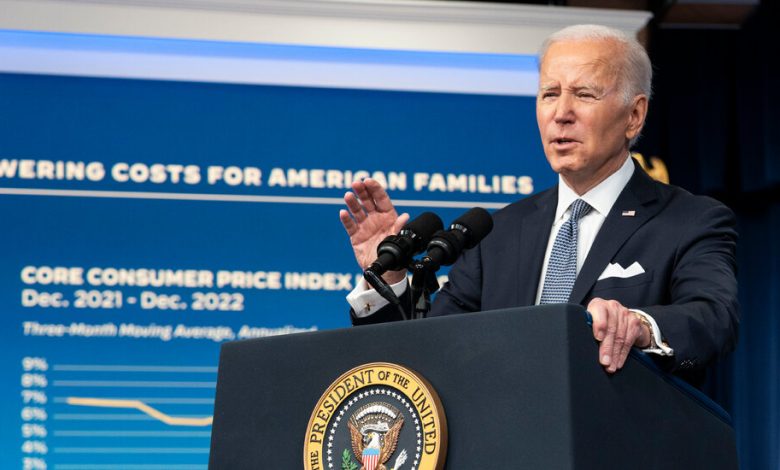Biden Set to Hammer House Republicans on the Economy

WASHINGTON — President Biden was set on Thursday to assail House Republicans over their tax and spending plans, including potential changes to popular retirement programs, as he ramps up for what is likely to be a run for re-election.
Mr. Biden will travel to a steamfitters union hall in Springfield, Va., for what White House aides billed as his first major economic speech of the new year. In it, officials said, he would amplify his attempts to take credit for continued job growth, a falling inflation rate and news from the Commerce Department on Thursday morning that the economy grew by 2.9 percent at the end of last year, at an annualized pace.
The president will seek to cast House Republicans and their economic policy proposals as roadblocks to continued improvement.
The speech builds on a pattern for Mr. Biden, who has found the new and narrow Republican majority to be both a political threat and an opportunity.
Republicans in the chamber have begun a series of investigations into Mr. Biden, his family and his administration. They have also demanded deep cuts in federal spending in exchange for raising the borrowing limit, a position that risks an economic catastrophe given the huge sums of money that the United States borrows to pay for its financial obligations.
The Biden Presidency
Here’s where the president stands as the third year of his term begins.
- State of the Union: President Biden will deliver his second State of the Union speech on Feb. 7, at a time when he faces an aggressive House controlled by Republicans and a special counsel investigation into the possible mishandling of classified information.
- Chief of Staff: Mr. Biden plans to name Jeffrey D. Zients, his former coronavirus response coordinator, as his next chief of staff. Mr. Zients will replace Ron Klain, who has run the White House since the president took office two years ago.
- Voting Rights: A year after promising a voting rights overhaul in a fiery speech, Mr. Biden delivered a more muted message at Ebenezer Baptist Church in Atlanta on Martin Luther King Jr.’s birthday.
The president has refused to tie any spending cuts to raising the debt limit and has called on Congress to increase the $31.4 trillion cap so that the nation can continue paying its bills and avoid a federal default.
But Mr. Biden, who is facing a divided Congress for the first time in his presidency, is increasingly acting as if the newly empowered conservatives have given him a political opening on economic policy. As he prepares for a likely re-election bid in 2024, he is seizing on the least popular proposals floated by House members to cast himself as a champion of the working class, retirees and economic progress.
House Republicans have not yet released a detailed or unified economic agenda, and they have not made a clear set of demands for raising the debt limit, though they largely agree that Mr. Biden must accept significant spending curbs.
But members and factions of the Republican conference have pushed for votes on a variety of proposals that have little support among voters, including raising the retirement age for Social Security and Medicare and replacing the federal income tax with a national sales tax.
Mr. Biden has sought to brand the entire Republican Party with those proposals, even though it is not clear if the measures have majority support in the conference or will ever come to a vote. Former President Donald J. Trump, who has already announced his 2024 bid for the White House, has urged Republicans not to touch the safety-net programs.
But important factions in the Republican Party continue to push for cuts to the growth of those programs in the name of reducing future accumulation of debt, and Mr. Biden has been happy to cast them as the true contrast to his economic agenda. He has pointedly refused to cut safety-net programs and has promised to veto any cuts to Social Security or Medicare.
“The president is building an economy from the bottom up and the middle out, and protecting Social Security and Medicare,” Karine Jean-Pierre, the White House press secretary, told reporters this week. “Republicans want to cut Social Security, want to cut Medicare — programs Americans have earned, have paid in — and impose a 30 percent national sales tax that will increase taxes on working families. That is what they have said they want to do, and that is clearly their plan.”
The focus on Republicans has allowed Mr. Biden to divert the economic conversation from inflation, which hit 40-year highs last year but receded in the past several months, though it remains above historical norms.
Progressive groups see an opportunity for Mr. Biden to score political points and define the economic issue before the 2024 campaign begins in earnest. That is in part because polls suggest Americans have little appetite for Social Security or Medicare cuts — and far less focus on the national debt — than House Republicans do.
“It is a political gift,” said Lindsay Owens, the executive director of the Groundwork Collaborative, a liberal nonprofit in Washington.